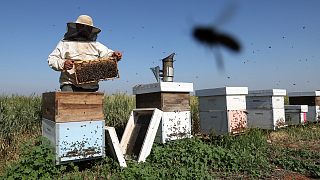Kenya
In Kenya, like in many other countries, bees are under threat.
Loss of habitat and intensive farming practices including the use of pesticides have led to a drastic reduction in the population of polinators in the last 30 years.
The consequences can be catastrophic as bees play a vital role in the food chain.
The most serious challenge is environmental degradation. Because people are cutting down trees because of population pressure, people want to settle, people want to establish farms, and every time people cut down trees, then this leads to a ripple of effects. For example, we know that honey bees survive on two products from plants, nectar and pollen, and every time you cut down trees then you get rid of nectar and pollen and this is the food for the bees", said the head of bees research Dr. Elliud Muli from South Eastern Kenya University.
In order to protect the pollinators it is necessary to implement new practices.
Scientific researchers are actively looking for the best bee-friendly insecticide solutions.
"We need to minimize the utilization of such chemicals and encourage ecological systems of control of such challenges. For example, use of biological interventions when it comes to such invasion of maybe locusts", defends John Henry Ogonda from the Department of Environmental Science in Africa Nazarene University.
For this specialist, the success of the fight to save bees depends on the collective efforts of many people.
"It's a multi-sectorial approach I would say. We need to have the livestock people, agriculture people, environment people and everyone and of course the beekeepers. All of us pulling together and looking forward to saving our bees", concluded Dr. Elliud Muli from South Eastern Kenya University.
Almost 35 percent of all invertebrate pollinators, particularly bees and butterflies, are facing extinction, according to the United Nations.









01:02
Pics of the day: April 25, 2024
01:35
Kenya: Local anti malaria drug production signals progress
01:02
Pics of the day: April 24, 2024
01:40
Nairobi residents grapple with floods aftermath
02:29
"Efficient food systems key to tackling food waste", UNEP programme manager
01:02
Pics of the day: April 23, 2024